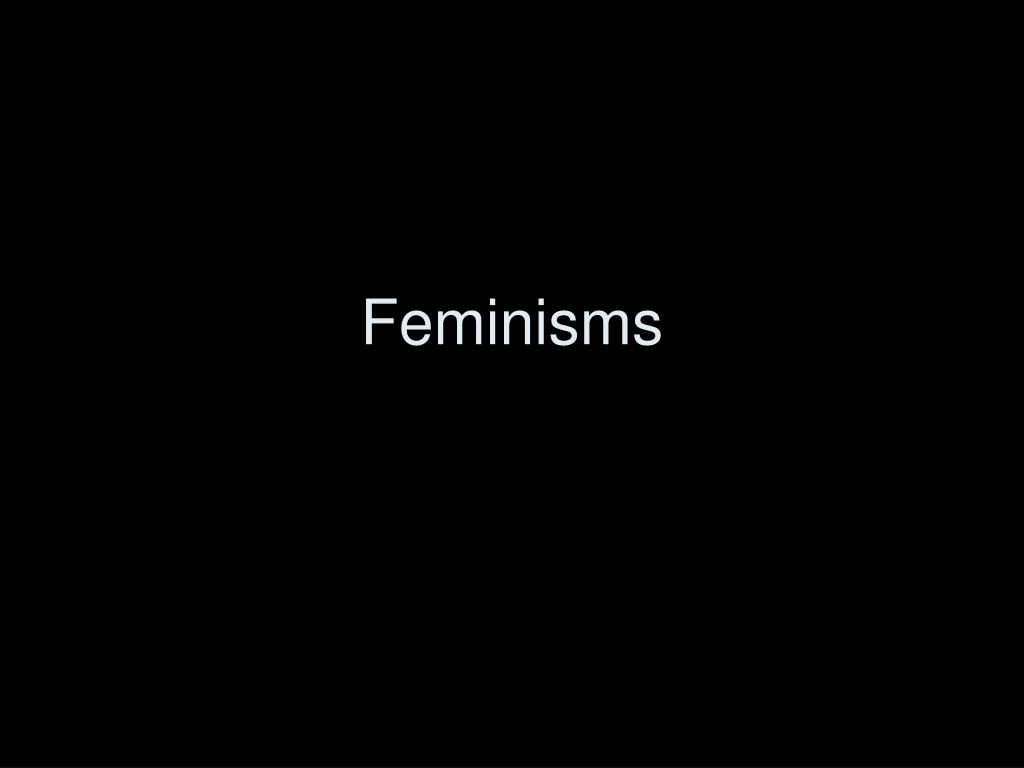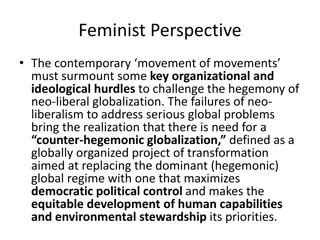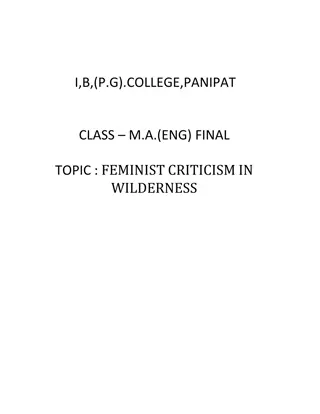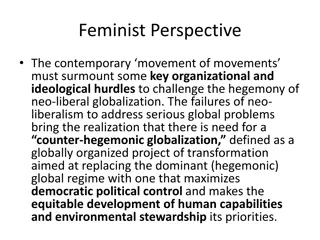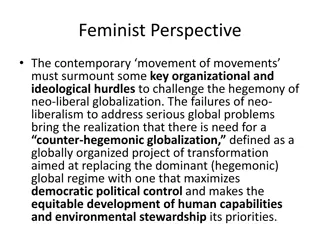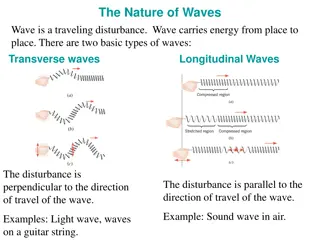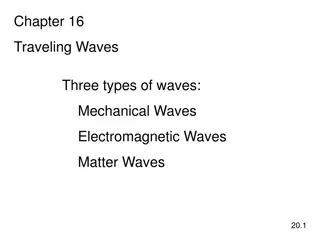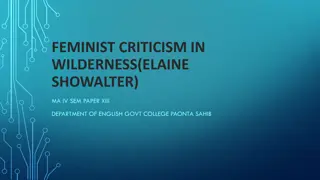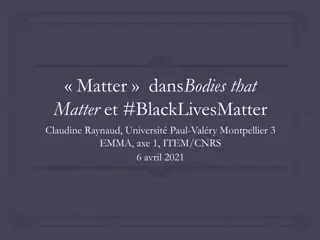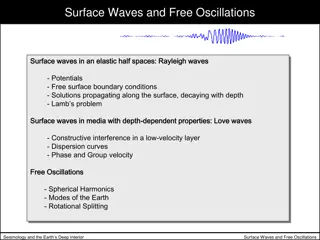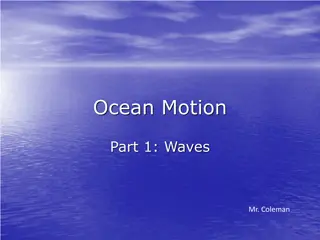Exploring Feminist Theories through Key Texts and Waves
Dive into the evolution of feminism through key texts like "Gender Trouble" by Judith Butler and "La Feminine" by Hélène Cixous. Explore the waves of feminism from the basic rights movements of the 19th century to the intersectional perspectives of the present day, examining concepts like performativity and the fluidity of gender constructs.
Uploaded on Sep 29, 2024 | 0 Views
Download Presentation

Please find below an Image/Link to download the presentation.
The content on the website is provided AS IS for your information and personal use only. It may not be sold, licensed, or shared on other websites without obtaining consent from the author. Download presentation by click this link. If you encounter any issues during the download, it is possible that the publisher has removed the file from their server.
E N D
Presentation Transcript
First Wave 19th century to 1950 (basic rights) Second Wave 1960-1980 (further rights) Third Wave 1980-2008 (queer, race) Fourth Wave 2008-? (technology)
Judith Butler, Gender Trouble (1990) If Lacan presumes that female homosexuality issues from a disappointed heterosexuality, as observation is said to show, could it not be equally clear to the observer that heterosexuality issues from a disappointed homosexuality? If there is something right in Beauvoir's claim that one is born, but rather becomes a woman, it follows that woman itself is a term in process, a becoming, a constructing that cannot rightfully be said to originate or to end. As an ongoing discursive practice, it is open to intervention and resignification.
Gender Trouble (1990) If gender attributes and acts, the various ways in which a body shows or produces its cultural signification, are performative, then there is no preexisting identity by which an act or attribute might be measured; there would be no true or false, real or distorted acts of gender, and the postulation of a true gender identity would be revealed as a regulatory fiction.That gender reality is created through sustained social performances means that the very notions of an essential sex and a true or abiding masculinity or femininity are also constituted as part of the strategy that conceals gender s performative character and the performative possibilities for proliferating gender configurations outside the restricting frames of masculinist domination and compulsory heterosexuality.
Hlne Cixous, "La Feminine" (1976) As dreamer and fantastic with double libido, voyager of several existences, she renounces none of her primitive liberties or those to come, all her sources of pleasure and all her means of acquiring pleasure persist in all forms which put them out of reach of the rivalry principle. As linguist the freedom with which she crosses several unconsciouses to transmit the secrets and powers of a soul in another tongue and of a body in another in which to grow and transform without restraint. And as artist of love, her knwoing-pleasure overflows her individual activities (psychical, cultural, historical) in the direction of the other: she has an unconquerable propensity to unite, join, connet together desires, languages, unconsciouses which the exigencies of Truthverility, communications and indwarfstry threaten to transform into sickness, and shelter them at the height of life.
Kate Millet, Sexual Politics (1969) The word "politics" is enlisted here when speaking of the sexes primarily because such a word is eminently useful in outlining the real nature of their relative status, historically and at the present. It is opportune, perhaps today even mandatory, that we develop a more relevant psychology and philosophy of power relationships beyond the simple conceptual framework provided by our traditional formal politics. Indeed, it may be imperative that we give some attention to defining a theory of politics which treats of power relationships on grounds less conventional than those to which we are accustomed. I have therefore found it pertinent to define them on grounds of personal contact and interaction between members of well-defined and coherent groups: races, castes, classes, and sexes. For it is precisely because certain groups have no representation in a number of recognised political structures that their position tends to be so stable, their oppression so continuous.
Valerie Solanas, S.C.U.M. Manifesto (1967) Niceness, Politeness, and `Dignity': Every man, deep down, knows he's a worthless piece of shit. Overwhelmed by a sense of animalism and deeply ashamed of it; wanting, not to express himself, but to hide from others his total physicality, total egocentricity, the hate and contempt he feels for other men, and to hide from himself the hate and contempt he suspects other men feel for him; having a crudely constructed nervous system that is easily upset by the least display of emotion or feeling, the male tries to enforce a `social' code that ensures perfect blandness, unsullied by the slightest trace or feeling or upsetting opinion. He uses terms like `copulate', `sexual congress', `have relations with' (to men sexual relations is a redundancy), overlaid with stilted manners; the suit on the chimp
Camille Paglia, Sexual Personae (1990) In the beginning was nature. The background from which and against which our ideas of God were formed, nature remains the supreme moral problem. We cannot hope to understand sex and gender until we clarify our attitude toward nature. Sex is a subset to nature. Sex is the natural in man. Human life began in flight and fear. Religion rose from rituals of propitiation, spells to lull the punishing elements... Civilized man conceals from himself the extent of his subordination to nature... But let nature shrug, and all is in ruin. Sexuality and eroticism are the intricate intersection of nature and culture. Feminists grossly oversimplify the problem of sex when they reduce it to a matter of social convention: readjust society, eleminate sexual inequality, purify sex roles, and happiness and harmony will reign. Here feminism, like all liberal movements of the past two hundred years, is heir to Rousseau.
Donna Haraway, Cyborg Manifesto (1984) The cyborg is a creature in a post-gender world; it has no truck with bisexuality, pre- oedipal symbiosis, unalienated labour, or other seductions to organic wholeness through a final appropriation of all the powers of the parts into a higher unity. I would rather be a cyborg than a goddess
Xenofeminst Manifesto (2005) XF seizes alienation as an impetus to generate new worlds. We are all alienated but have we ever been otherwise? It is through, and not despite, our alienated condition that we can free ourselves from the muck of immediacy. Freedom is not a given and it s certainly not given by anything natural . The construction of freedom involves not less but more alienation; alienation is the labour of freedom s construction. Nothing should be accepted as fixed, permanent, or given neither material conditions nor social forms. XF mutates, navigates and probes every horizon. Anyone who s been deemed unnatural in the face of reigning biological norms, anyone who s experienced injustices wrought in the name of natural order, will realize that the glorification of nature has nothing to offer us the queer and trans among us, the differently-abled, as well as those who have suffered discrimination due to pregnancy or duties connected to child-rearing. XF is vehemently anti-naturalist. Essentialist naturalism reeks of theology the sooner it is exorcised, the better.
Paul (Beatriz) Preciado, Testo Junkie: Sex, Drugs, and Biopolitics in the Pharmacopornographic Era (2008) Contemporary society is inhabited by toxic-pornographic subjectivities: subjectivities defined by the substance (or substances) that supply their metabolism, by the cybernetic prostheses and various types of pharmacopornographic desires that feed the subject s actions and through which they turn into agents. So we will speak of Prozac subjects, cannabis subjects, cocaine subjects, alcohol subjects, Ritalin subjects, cortisone subjects, silicone subjects, heterovaginal subjects, double-penetration subjects, Viagra subjects, $ subjects
Paul (Beatriz) Preciado, Testo Junkie: Sex, Drugs, and Biopolitics in the Pharmacopornographic Era (2008) There is nothing to discover in nature; there is no hidden secret. We live in a punk hypermodernity: it is no longer about discovering the hidden truth in nature; it is about the necessity to specify the cultural, political, and technological processes through which the body as artifact acquires natural status.
Virginie Despentes, King Kong Theory (2006) As a girl, I am more King Kong than Kate Moss. I'm the kind of girl you don't get married to, the kind you don't have babies with. I am writing as a woman who is always too much of everything-too aggressive, too noisy, too fat, too rough, too hairy, always too masculine, I am told. And yet it's my virile, masculine qualities that make me more than just any old social misfit. I owe to my very masculinity everything I like about my life, everything that has saved me. I am writing therefore as a woman incapable of attracting male attention, satisfying male desire, or being satisfied with a place in the shade. It's from here that I write, as an unattractive but ambitious woman, drawn to money I make myself, drawn to power, the power to do and to say no, drawn to the city rather than the home, excited by experience and not content with just hearing about it from others.
Virginie Despentes, King Kong Theory (2006) The special treatment until now reserved for women, with shame as the primary tool for ensuring their isolation, passivity, and lack of protest, could now be extended to all. To understand the mechanics of how women have been made to feel inferior, and induced to willingly maintain themselves in this state, is to understand how the entire population is kept under control. Capitalism is an egalitarian religion in the sense that it demands general submission, making everyone feel trapped-as all women are.
Angellicas Lament, Aphra Behn Had I remained in innocent security, I should have thought all men were born my slaves, And worn my power like lightning in my eyes, To have destroyed at pleasure when offended. But when love held the mirror, the undeceiving glass Reflected all the weakness of my soul, and made me know My richest treasure being lost, my honour, All the remaining spoil could not be worth The conqueror s care or value. Oh how I fell like a long worshipped idol Discovering all the cheat.
Alison Fell, Pushing forty Just before winter we see the trees show their true colours: the mad yellow of chestnuts two maples like blood sisters the orange beech braver than lipstick Pushing forty, we vow that when the time comes rather than wither ladylike and white we will henna our hair like Colette, we too will be gold and red and go out in a last wild blaze
